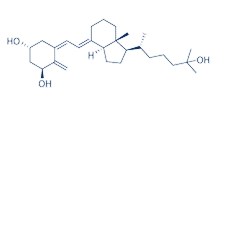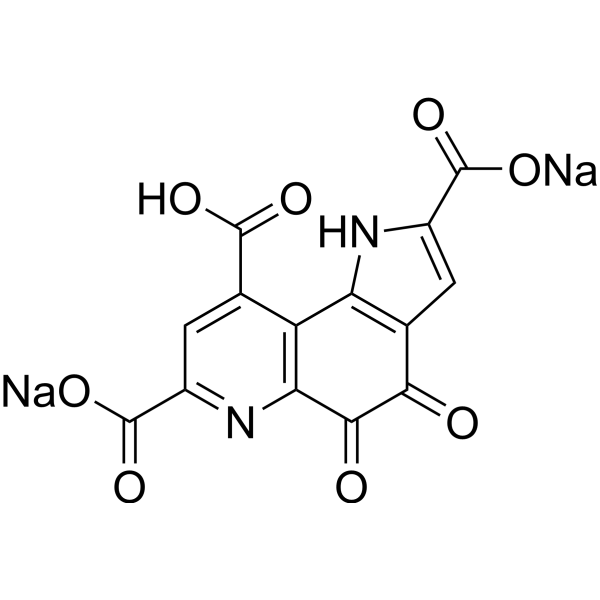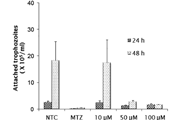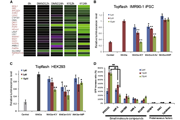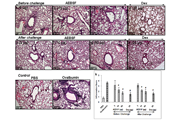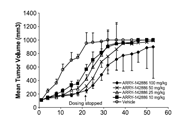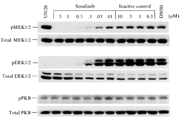-
生物活性
Active metabolite of vitamin D3 that activates the vitamin D receptor (VDR). Displays calcemic actions; stimulates intestinal and renal Ca2+ absorption and regulates bone Ca2+ turnover. Exhibits antitumor activity; inhibits in vivo and in vitro cell proliferation in a wide range of cells including breast, prostate, colon, skin and brain carcinomas and myeloid leukemia cells.Calcitriol participates in developmental regulation and signaling. It stimulates an increase in protein kinase C levels with an effect on the regulation of c-myc transcription and activation of Raf kinase. Calcitriol is shown to increase the synthesis of prostacyclin with a correlated increase in cyclooxygenase activity, indicating a further role in vascular regulation. Calcitriol is an activator of PKC and VDR.
Calcitriol suppressed IL-2 production withan IC50 of ~1nM.[1]
Anti-proliferative effect of calcitriol
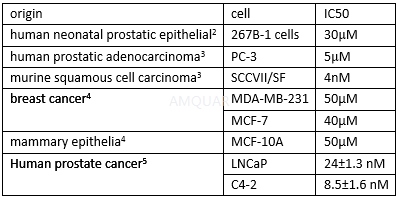
-
体外研究
-
体内研究
-
激酶实验
-
细胞实验
Drugs[5]
Calcitriol (MW 416.63 g/mol), was obtained.The stock solution was prepared by dissolving calcitriol in 100% ethanol. Thestock was stored at -20 oC protected from light.Drugs were added into the culture media at a final ethanol concentration of<0.1%.
Cellculture
The androgen-sensitive LNCaP human prostatecancer cell line and the LNCaP derived androgen- independent cell C4-2 weremaintained in RPMI 1640 containing L-glutamine and supplemented with 5% fetalbovine serum, 100 U/ml penicillin, and 100 mg/ml streptomycin. Both cell typeswere maintained in a humidified atmosphere of 5% CO2/95% air at 37oCin an incubator, and the media was changed every 48 h. When cultures grew to70% confluence in 15 cm (diameter) plates, the media was aspirated and thecells were washed with phosphate buffer solution (PBS), and then used forfurther culturing and treatments
Cellproliferation assay
The effects of calcitriol on cellproliferation were determined using the 5-bromo-20-deoxyuridine (BrdU) incorporationassay. Cells were seeded in 96-well plates (3000 cells per well) and wereincubated with varying concentrations of calcitriol (ranging from 0 to 100 nM)for 72 h. The culture medium containing agents was left for the full 72 h undisturbed.BrdU reagent was added to the culture media 10 h before termination of theexperiment. The extent of BrdU incorporation into cells was determined with ananti-BrdU antibody, and absorbance was measured at dual wavelengths of 450/540nm with an OptiMax microplate reader. Each experiment was repeated threeindependent times in duplicates.

-
动物实验
AnimalExperiments[2]
37, 20 to 25-day-old Sprague-Dawley ratsweighing 79 to 95 gm were used for the experiments. The rats were divided into4 groups, and groups 1 and 2 of 8 rats each served as controls. Animals in groups1 and 2 received intraperitoneal injections of the vehicle (0.35 ml. 100%ethanol in 0.5cc PBS). There were 11 and 10 rats in groups 3 (11 rats) and 4,respectively, that received intraperitoneal injections of 0.35 mg calcitriol in0.5cc PBS. Animals in all groups received injections on alternate days between27 and 38 days of age. The rats were fed with vitamin D deficient foodcontaining 0.3% calcium and 0.4% phosphate, and total body weight was measuredon alternate weeks.
Animals in groups 1 (control) and 3(calcitriol) were sacrificed at 100 days of age. Animals in groups 2 (control)and 4 (calcitriol) were given subcutaneous injections of DHT for 5 days at adose of 1 mg. per day dissolved in 500 ml. ethanol and 2 ml. sesame oil, andmaintained for 2 additional weeks before sacrifice. At sacrifice the animalswere weighed, and serum was collected by cardiac puncture and stored foranalysis of calcium and testosterone levels. The prostates and seminal vesicleswere harvested from each animal and weighed. Prostate tissue from each animalwas sent for histopathological examination and analysis of NMP composition. Theharvested prostates were embedded in paraffin, sectioned, stained with hematoxylinand eosin, and examined by a pathologist blinded to which treatment the animalshad received.
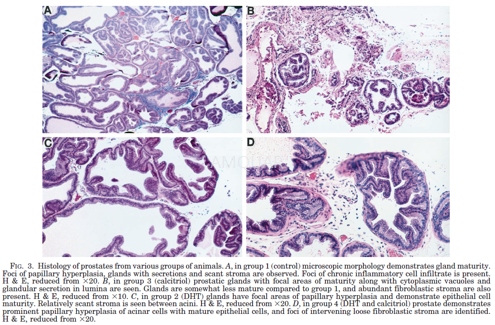
-
不同实验动物依据体表面积的等效剂量转换表(数据来源于FDA指南)
|  动物 A (mg/kg) = 动物 B (mg/kg)×动物 B的Km系数/动物 A的Km系数 |
|
例如,已知某工具药用于小鼠的剂量为88 mg/kg , 则用于大鼠的剂量换算方法:将88 mg/kg 乘以小鼠的Km系数(3),再除以大鼠的Km系数(6),得到该药物用于大鼠的等效剂量44 mg/kg。
-
参考文献
[1] Rigby WF, Stacy T, Fanger MW. Inhibition of T lymphocyte mitogenesis by 1,25-dihydroxyvitamin D3 (calcitriol). J Clin Invest. 1984;74(4):1451-1455.
[more]
分子式
C27H44O3 |
分子量
416.64 |
CAS号
32222-06-3 |
储存方式
﹣20 ℃冷藏长期储存。冰袋运输 |
溶剂(常温)
|
DMSO
85 mg/mL |
Water
<1 mg/mL |
Ethanol
85 mg/mL |
体内溶解度
-
Clinical Trial Information ( data from http://clinicaltrials.gov )
注:以上所有数据均来自公开文献,并不保证对所有实验均有效,数据仅供参考。
-
相关化合物库
-
使用AMQUAR产品发表文献后请联系我们





